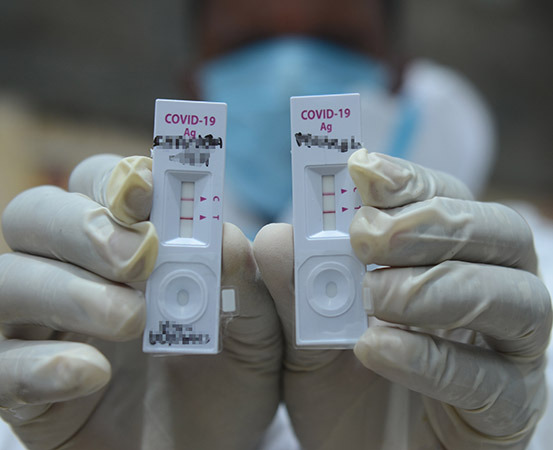
Although COVID is primarily a viral infection that affects the lungs, it can also have a severe impact on the heart. Several reports state that there has been a rise in cases of heart attacks and other heart issues after COVID recovery. Experts say COVID can damage the heart, increasing the risk of cardiovascular diseases. The viral infection can put those with a history of heart conditions at increased risk of severe complications. However, it can also affect those with no prior history of heart problems, irrespective of their age, gender or other comorbidities.
Dr Kumar Kenchappa, consultant interventional cardiologist, Manipal Hospital, Bangalore, says after the second wave of COVID-19, many are experiencing cardiac issues even though they only had a mild COVID infection and did not require hospitalization. “Most of them had no pre-existing heart conditions,” he adds.
Can COVID-19 lead to heart attacks?
Initially, COVID caused pulmonary embolisms, but during the second and third waves, it also led to blockages in the coronary arteries, increasing the number of heart attack cases, says Dr Kenchappa. “Usually, heart attacks are caused due to cholesterol deposition in the arteries, but COVID was causing thrombosis (blood clots in the artery) without any such fat deposition. That is how COVID was increasing the rate of heart attacks,” he explains.
COVID, like other viral infections, can affect the muscles of the heart, causing inflammation. Dr Sandeep Das, professor of medicine, department of internal medicine’s division of cardiology, UT Southwestern Medical Center, Dallas, Texas, USA, says, “While inflammation of the heart muscle with an active COVID infection can be fairly common, severe heart complications are uncommon in people with no prior history or risk factors. COVID can have a direct effect on the heart muscle, causing myocarditis that can ultimately result in heart failure. Although this is rare, it can be a devastating complication.”
A recently published study in the journal Circulation stated that the prevalence of myocarditis was 6.7 percent in people hospitalized with severe COVID infection and high cardiac troponin levels.
Can COVID affect your heart rate?
Dr Kenchappa says that in some cases, myocarditis can severely damage the heart by reducing its pumping capacity. However, it is too early to come across such cases. “It’s been only two to three years since COVID. Maybe in five or six years, we might see cases with permanent damage to the heart due to COVID,” he shares.
One of the other mechanisms by which COVID can affect the heart is by causing a calcium leak. “It reduces the calcium reserve, weakening the heart muscles. But it is not that common,” he notes.
He further adds that the heart problems observed after COVID recovery include a high heart rate, myocarditis, heart attacks and postural tachycardia syndrome, where the heart rate increases very quickly when one stands up after sitting or lying down. “A lot of people are coming back to hospitals [after COVID recovery] with dizziness, a high heart rate and shortness of breath, which can be either due to a lung or heart issue,” he explains.
Dr Das says most of the well-documented cardiac complications of COVID are seen in the context of acute infection. Even if COVID symptoms are not severe, the following potential signs of heart problems or stroke should prompt further evaluation:
- Chest pain
- Progressively worsening shortness of breath
- Changes in speech
- Numbness or weakness in an arm or a leg
“There is also a less well-defined but no less real group of people who develop long-term symptoms after COVID, such as exercise intolerance or lightheadedness. This is an important area of ongoing research,” he adds.
According to him, heart damage caused by COVID is usually mild and temporary, discovered incidentally by sensitive blood tests. However, significant and permanent heart damage can occur, especially in the context of severe COVID infection and pre-existing cardiac risk factors.
Vaccination and, to a lesser extent, prior infection are protective, although they do not reduce the risk to zero. “Despite vaccination or prior infection, it is possible to get infected. However, the severity in vaccinated people tends to be significantly lower than in those who are not vaccinated,” he says.
How to improve heart health after COVID
Experts say there has been a rise in mental stress and anxiety issues in people recovering from COVID, which has led to an increase in high blood pressure cases. High blood pressure can affect the heart as well. According to them, maintaining good heart health after COVID is not that different from doing so in general. Some lifestyle measures for maintaining a healthy heart include:
- Quitting smoking
- Doing moderate-intensity workouts for 150 minutes a week or brisk walking for 45 minutes to an hour every day
- Having a healthy and well-balanced diet
- Avoiding stress and anxiety
- Preventing other infections or exposure to viruses by maintaining good hygiene, practicing good food safety techniques and getting vaccinated
- Managing other comorbid conditions, like diabetes
- Maintaining an ideal body weight
However, they also encourage people to ease back into activities after COVID recovery and listen to their bodies.
Takeaways
- Besides affecting people with a history of heart conditions, COVID can also cause heart problems in those who don’t have a history of the same, irrespective of their age and gender.
- Cardiac complications observed after COVID include a high heart rate, myocarditis, heart attacks and postural tachycardia syndrome.
- People should look out for signs of heart problems, which include chest pain, breathlessness, lightheadedness and an elevated heart rate.
- Maintaining an active lifestyle, exercising regularly, having a balanced diet and managing other comorbidities can help reduce the risk of heart issues post-COVID.

















